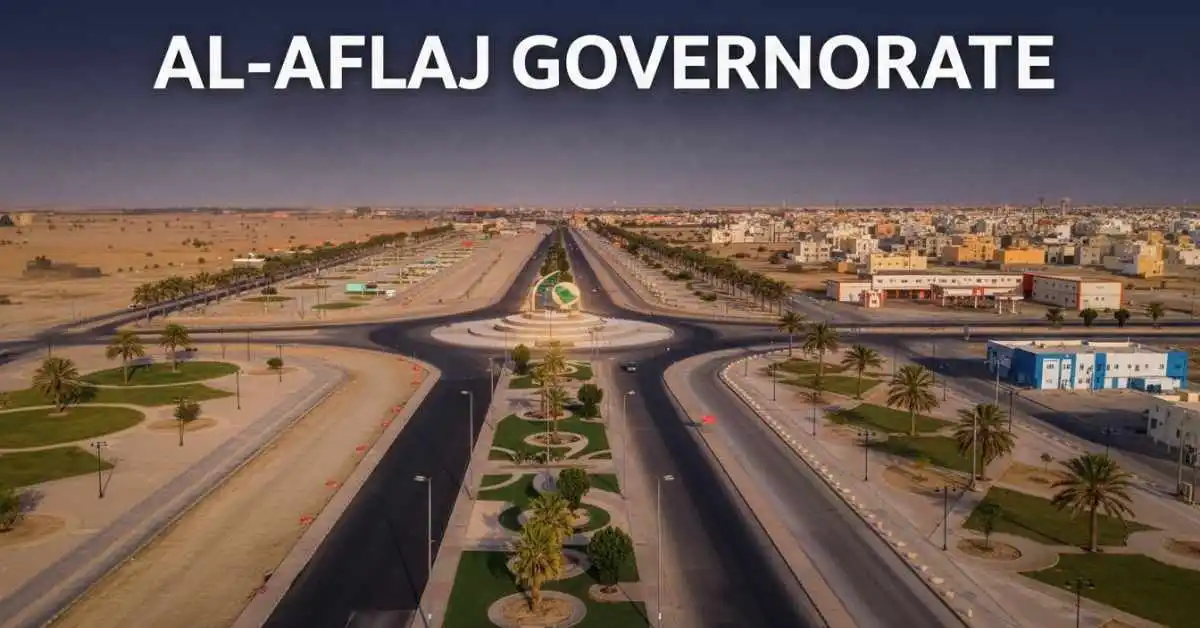INFO BOX
Facts About Al-Aflaj Governorate:
- Located in Riyadh Province, central Saudi Arabia
- 3rd largest governorate in Riyadh by area
- Area: 51,000 km²
- Population: 54,500 people (2022)
- Famous for: Dates, history and ancient buildings
- Has over 800,000 date palm trees
- Special feature: Underground water canals (al-Kharaz)
- Nearest airport: Wadi ad-Dawasir Airport (295 km away)
- Connected to famous love story from 700 AD
What is Al-Aflaj Governorate (محافظة الأفلاج)
Al-Aflaj Governorate is special place in Riyadh Province in central part of Saudi Arabia. It is third largest governorate in Riyadh by area. About 54,500 people live there according to the 2022 census.
Think of Al-Aflaj as a quiet, agricultural region with a rich history. Here is not crowded. It has only 1.07 persons per square kilometer which means lots of open space and nature.
Where is Al-Aflaj
Al-Aflaj is located southeast of Riyadh city. It has neighbors all around:
- North: al-Kharj and Hawtat Bani Tamim Governorates
- South: al-Sulayyil Governorate
- East: Eastern Province
- West: Wadi ad-Dawasir and al-Quwaiyah Governorates
Famous Love Story from History
Here is something interesting. Al-Aflaj is famous for a beautiful love story from 1,400 years ago. It is about:
- Qays Bin al-Mulawwah (known as Majnun Layla)
- Layla al-Amiriyyah (his beloved)
They lived in the seventh century and their love story became famous in Arabic poetry. Mount Toubad is a mountain in Al-Aflaj connected to their story. It is now a historical site that many people visit.
Beautiful Old Buildings
Al-Aflaj has amazing ancient mud buildings that are hundreds of years old. Here is what makes them special:
- Built from burnt mud bricks
- Walls are over 3 meters thick (very strong!)
- Coated with gypsum (white coating)
- Some buildings are half-buried in sand dunes
You can visit Sadah Village, Murgham Fortress, al-Adi Palace and Salma Palace. There is also a heritage mosque called al-Huzaimi and a private museum.
Underground Water System (Al-Kharaz)
One of coolest things about Al-Aflaj is its underground water canals called al-Kharaz. This is ancient engineering. Here is how it works:
- Water flows underground from natural springs
- Small channels provide ventilation and lighting
- The system is still in its original condition
- It helped farmers water their crops for hundreds of years
Archaeological Sites
Scientists have found important ancient sites in Al-Aflaj. The most famous is Qusairat ‘Ad which dates back to ancient times. In 2021, the Heritage Commission started a big project to study and protect these sites.
What they found:
- Ancient buildings and houses
- Springs and irrigation channels
- Pottery and storage areas
- Ancient ovens used for cooking
Famous for Dates
Al-Aflaj is one of best places for growing dates in Saudi Arabia. Here is why:
- 800,000+ date palm trees in the governorate
- Fertile soil and good climate
- Flowing water from springs and valleys
Types of dates grown: Khalas, Sukkari, Barhi, Safari and many more.
Every year, Al-Aflaj holds a special date festival where people celebrate the date harvest.
Education and Services
Al-Aflaj also has:
- Prince Sattam Bin Abdulaziz University (College of Science and Humanities)
- Technical College branch
- Many charitable associations helping families and communities
How to Get There
- Nearest airport: Wadi ad-Dawasir Domestic Airport (295 km away)
- Second nearest: King Khalid International Airport in Riyadh (328 km away)
Why Visit Al-Aflaj
If you love history, nature and fresh dates, Al-Aflaj is perfect. You can see ancient buildings and learn about a 1,400 year old love story, taste delicious dates and enjoy the beautiful landscape.
Stay updated
Follow us for latest Guides:
✅ WhatsApp Channel
☑️ Telegram Channel

